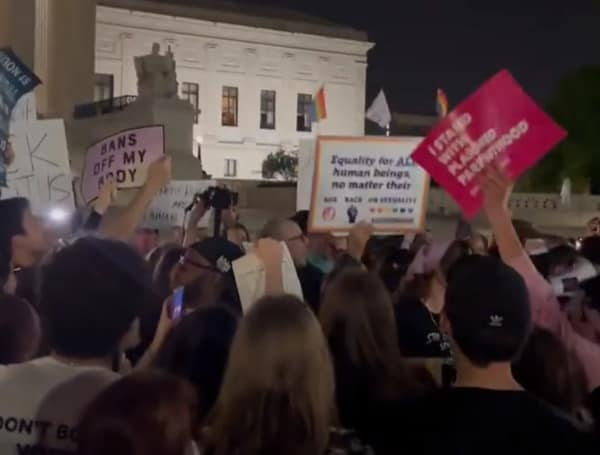As far as Washington’s bureaucracies go, the U.S. Supreme Court is likely among the smallest. About 520 people, including the justices, work for the court.
But while federal authorities have had no problem tracking down 1,000 people from across the country who allegedly rioted at the U.S. Capitol two years ago, they cannot find the source of a leak that endangered a justice’s life from a group half that size that all work in the same building.
As the Washington Free Beacon reported on Thursday, the court “has failed to identify the person who leaked a copy of a draft decision in Dobbs v. Jackson Women’s Health Organization, which revealed the Court was poised to overturn Roe v. Wade.”
That leak, which occurred in May and, in fact, did signal the court’s intention to overturn the court’s 1973 ruling that legalized abortion, was the first of its kind in the court’s history.
In the news: GOP Rep. Byron Donalds Receives Copy Of “Uncle Tom’s Cabin” As Apparent Racial Slur
The opinion, written by Justice Samuel Alito, was leaked to Politico. In the aftermath, as The Free Press reported, deranged liberals have attacked more than 100 churches, crisis pregnancy centers, and pro-life nonprofits — with few arrests.
In a statement released on Thursday, the court noted that the incident was “one of the worst breaches of trust in its history.”
“The leak was no mere misguided attempt at protest. It was a grave assault on the judicial process,” the statement continued. The justices also dubbed the breach an “extraordinary betrayal of trust.”
Yet despite all that, the statement noted, “After months of diligent analysis of forensic evidence and interviews of almost 100 employees, the [Supreme Court] Marshal’s team determined that no further investigation was warranted with respect to many of the ‘82 employees [who] had access to electronic or hard copies of the draft opinion.’”
“The Marshal’s team … has to date been unable to identify a person responsible by a preponderance of the evidence.”
Interestingly, investigators ruled out the possibility of a hack, meaning the leak was an inside job.
Yet despite conducting 126 interviews of 97 court employees, and narrowing the actual universe of people with access to the opinion to 80 staffers, the court’s cops came up empty.
In the news: Polling Shows Biden Approval Rating Sinks With Classified Docs
As the report noted, “The interviews provided very few leads concerning who may have publicly disclosed the document. Very few of the individuals interviewed were willing to speculate on how the disclosure could have occurred or who might have been involved.”
That applied as well to anyone who may have had contact with Politico.
While investigators “looked closely” at any staffer who may have had contact with the media, they could not say for sure whether someone snuck the opinion out, and likely could not catch them even if they did.
As the report stated, “There was no evidence discovered that anyone emailed the draft opinion to anyone else, although technical limitations in the Court’s computer recordkeeping at the time made it impossible to rule out this possibility entirely.”
Investigators “diligently” followed up on possible leads, yet all of that produced nothing, even as “some [court] personnel [admitted they] handled the Dobbs draft in ways that deviated from their standard process for handling draft opinions.”
What the probe did uncover is lackluster IT security policies at the court.
In the News: Florida Republican, U.S. Rep. Greg Steube Recovering After A 25-Foot Fall From Ladder
In its conclusion, the court noted, “In time, continued investigation and analysis may produce additional leads that could identify the source of the disclosure.”
“Whether or not any individual is ever identified as the source of the disclosure, the Court should take action to create and implement better policies to govern the handling of Court-sensitive information and determine the best IT systems for security and collaboration.”
Android Users, Click Here To Download The Free Press App And Never Miss A Story. Follow Us On Facebook Here Or Twitter Here.

